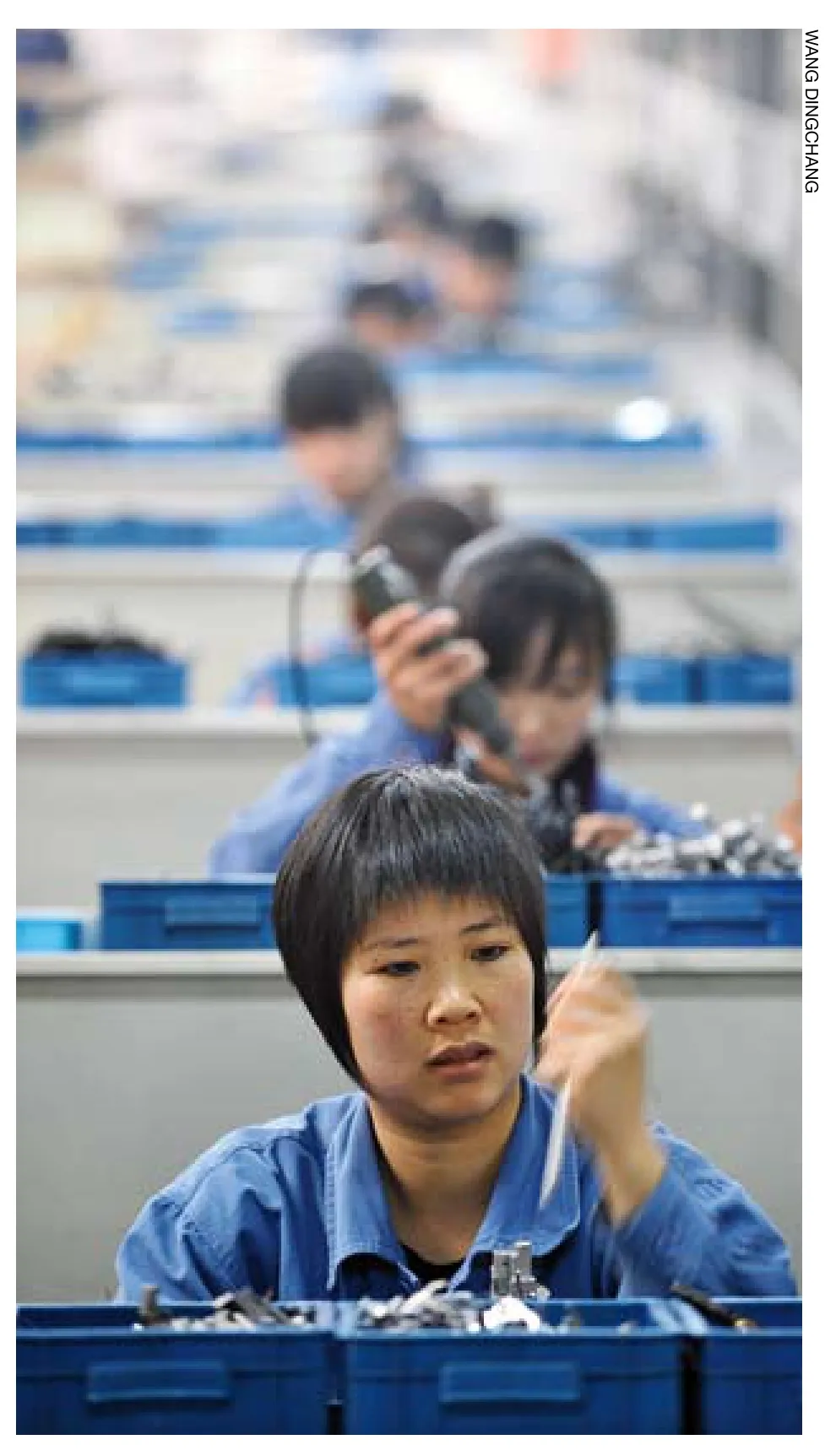A Helping Hand
2011-10-14ByLANXINZHEN
By LAN XINZHEN
A Helping Hand
By LAN XINZHEN
Soothing the financial woes for smaller businesses in China proves challenging when banks refuse to loan
Embattled small and medium-sized enterprises (SMEs) should be able to fnd their way out of the current fnancial quagmire as long as they receive suffcient fnancial support, said a recent report of the National School of Development (NSD) of Peking University.
But these hopes remain distant dreams since obtaining bank loans has proven all but impossible for many of China’s SMEs.
Zhejiang and Guangdong provinces are home to numerous SMEs, and the acute fnancial diffculties facing SMEs there show that China still has ground to cover to remove financing bottlenecks choking the development of smaller frms.
Implementation matters
As early as 2000, the Chinese Government released policies to encourage commercial banks to strengthen services to SMEs.
In 2002, China promulgated the Law on Promotion of Small and Medium-sized Enterprises, requiring banks and credit cooperatives to enhance credit support for SMEs and develop fnancial products targeting these enterprises.
In 2005, the State Council released a set of policies encouraging policy banks and strengthening financial services like transferred loans and guaranteed loans to SMEs.
In 2010, the government required stateowned commercial banks and shareholding banks to set up departments focused on fnancial services for SMEs, improve their credit business system for SMEs, and increase the proportion and scale of SME credit.
However, it seems that those measures have yet to be properly implemented. The NSD recently conducted a survey of more than 3,000 SMEs in Zhejiang and Guangdong and found that only 10-15 percent of the respondents had received bank loans.
Zhou Qiren, Director of the NSD, said many smaller companies tried to purchase advanced equipment to upgrade their technologies and productivity in response to the ongoing downturn.
“But that requires a huge amount of funds in far excess of their own capital,” said Zhou.“Meanwhile, the threshold for SME loans is more demanding.”
Many banks said they have attached signifcant importance to SMEs, but actually they still consider vulnerable smaller businesses larger risks and fear that they will get stuck with bad debts, he said.
“During the investigation, we have found many cases of crisis-stricken SMEs being brought back to life and health by an injection of credit capital,” he said.
In addition, 76 percent of the surveyed SMEs needed less than 1 million yuan ($157,480). Nevertheless, banks still shut their doors to them, added Zhou.
“Although the government has spared no effort to push for better fnancing support to SMEs, commercial banks remain less willing to follow the call due to their risk-averse business model,” said the NSD report.
Because of a lack of access to bank credit, many entrepreneurs had to turn to their friends and relatives. The NSD survey showed that 31 percent of the respondents relied on friends and relatives as the largest source of capital.
Worse still, some engulfed SMEs borrowed from underground banks at surprisingly high interest rates, triggering serious debt risks. The NSD report said interest rates of underground banks in Zhejiang Province mostly range from 24-36 percent. Some unscrupulous underground banks even lend at interest rates of 48-60 percent. Such intolerable fnancing costs pushed many SMEs into deeper problems, and some insolvent companies eventually went bankrupt.

( L e f t ) I M P L E M E N T A T I O N F I R S T : W o r k e r s o f Z h e j i a n g F e i y u e G r o u p , a p r i v a t e k n i t t i n g m a c h i n e m a n u f a c t u r e r i n T a i z h o u , Z h e j i a n g P r o v i n c e , w o r k o n a n a s s e m b l y l i n e

Wenzhou accounts for less than 1 percent of the national gross domestic product and re-portedly has more than 400,000 mostly small frms that rely heavily on the informal market for fnancing.
“But the size of informal lending is relatively small and the concerns about its direct impact on the formal banking sector and the economy are exaggerated,” said Wang Tao, chief China economist with the UBS. “The bigger risks are credit withdrawal in both the formal and informal lending market and contagion.”
Looming concern
Reports have fooded the media recently that tight monetary policies along with slowing economic growth have bankrupted many smaller frms in coastal regions.
According to the NSD survey, 72.45 percent of the small companies polled in the Pearl River Delta expect to break even or report modest losses in the next six months, and 3.29 percent expect to rack up painful losses or even suspend operations.

WANG DINGCHANG
Meanwhile, the survey showed more expensive raw materials and labor cost infation were major factors squeezing SMEs’ profts. The raw material prices in most industries have surged 20-50 percent so far this year. The fabric costs of the apparel industry even jumped 30-80 percent. Also, wages of workers at small enterprises have soared 20-30 percent, and compensation for high-grade technicians has skyrocketed more than 100 percent.
Worse still, many small companies are receiving a deadly blow of decreasing export orders. According to results of the NSD survey, export orders for small companies in the Pearl River Delta have shrunk 30 percent compared with the same period last year as external demand weakened because of the European and U.S. debt crisis. Moreover, Chinese exporters are losing some market shares to low-cost manufacturers in Viet Nam and India. The domestic property market downturn also reduced demand for products like construction materials.
The shrinking orders have led to a falling operating rate for small firms. In the Pearl River Delta, the average operating rate for small companies has slid to 70.92 percent.
In Zhejiang, the situation is no less acute. The NSD survey showed 18.63 percent of polled small companies in the province had shut down, and only 40 percent were operating at more than 90 percent of capacity.
Zhou Dewen, head of the Wenzhou Small and Medium-sized Enterprises Promotion Association, said woes of exportoriented SMEs are attributed to fragile overseas markets, domestic infation and appreciation of the yuan.
“The SMEs can surely tide over the hard time if they are supported with enough capital,” he said.
Possible solutions
The NSD report said it is necessary now to materialize policies to help fnancially strained SMEs, such as establishing specialized financial institutions serving SMEs.
As black market lenders are more willing to extend credit to SMEs, it would also help if China allowed some underground banks to become legal lenders, and keep tight supervision over the informal lending market to fend off fnancial risks, said the report.
Banks avoid lending to SMEs they deem uncreditworthy. As a result, the report suggested the country strengthen efforts to improve the credit record system and make better use of the credit information of small enterprises.
The report said data for small firms reflects their operation and credit situations, but the information is not compiled in one database but is in the hands of different institutions. For example, the registration information is at industrial and commercial departments, the export information is held by customs, and their financial data stays with the banks. China is supposed to use that information to set up a credit system for small companies and evaluate their solvency.
The report also suggested collecting small firms’ information from electricity, housing and environment protection departments to build a comprehensive database. That can give financial institutions easier access to information about small enterprises and help them provide targeted fnancial services for small frms.
Zhou Qiren, Director of the NSD, said global downside risks are mounting as the impact of the European and U.S. debt woes ripple throughout the world. But domestic infation remains stubbornly high, so China’s policymakers should not relax their monetary stance.
Zhou suggested the state take more targeted measures for small companies as soon as possible, such as tax reductions.
“Favorable tax policies can be more instrumental than monetary easing in supporting the suffering SMEs,” said Zhou.
